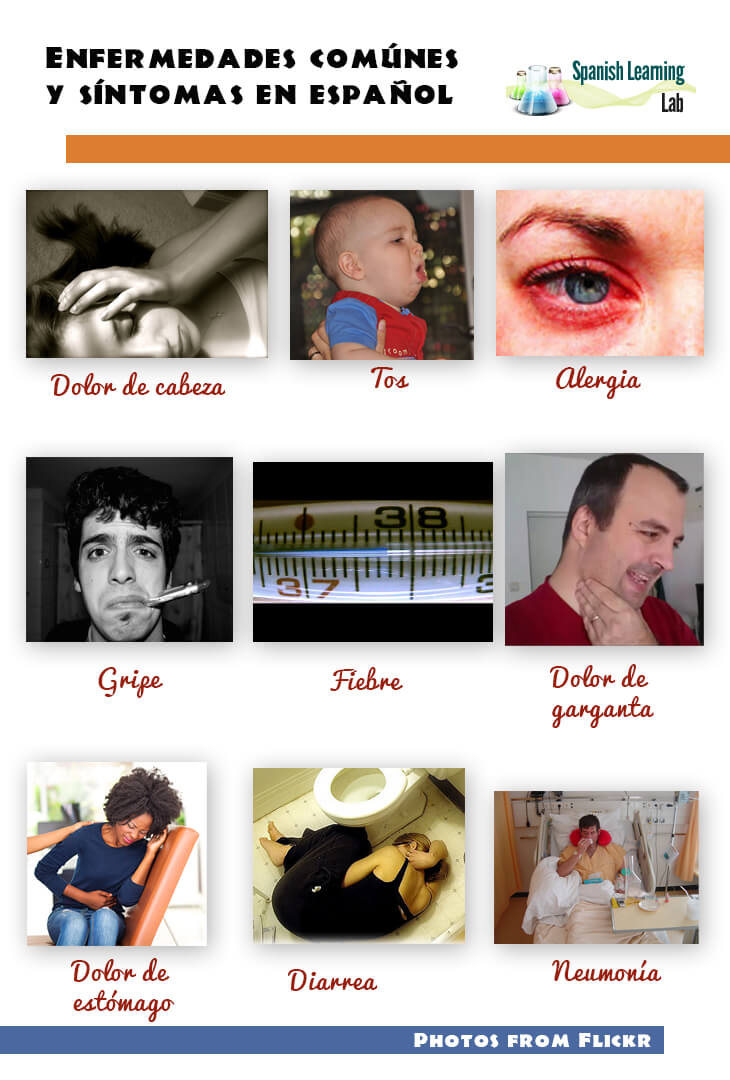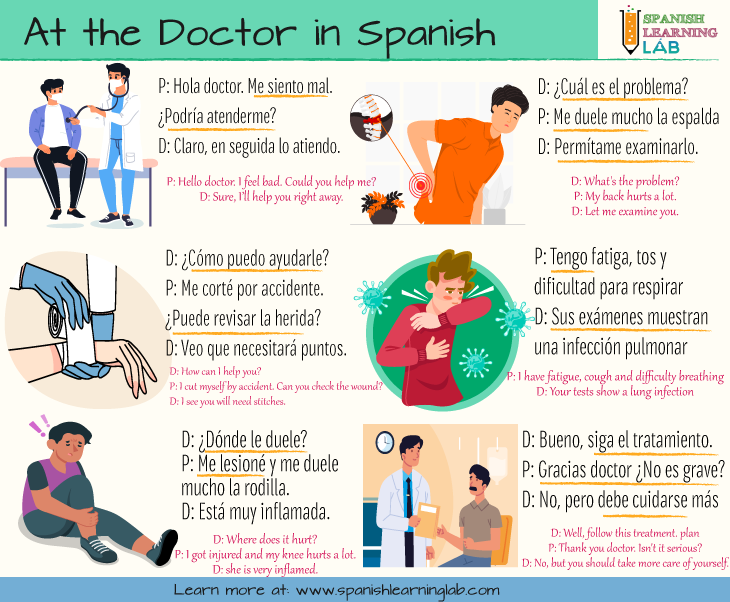¡Hola nuevamente! Today’s lesson will cover some very useful phrases and questions for having a basic doctor and patient conversation in Spanish. To do so, we have included the names of some common illnesses in Spanish, as well as a dialogue (listening activity) resembling a real visit to the doctor in Spanish. We will also introduce the basics about the present perfect in Spanish. Let’s start…
Vocabulary Introduction: A list of Common illnesses in Spanish
First, please take a look at the picture showing how to say some common illnesses in Spanish – enfermedades comunes. As you may notice, some of them are very similar in both languages, while others are totally different. You may listen to the pronunciation of these words in the podcast below the image.

Some useful questions and phrases at the doctor in Spanish
How to reply to “what’s the matter” in Spanish
The doctor will often ask you the following questions meaning “what’s the matter in Spanish” : ¿Cómo te sientes?, ¿Cuál es el problema? or ¿Cómo puedo ayudarte?. In order to reply, we will generally use the phrases “Me siento con + síntoma”, e.g. “Me siento con fiebre”, or even better with “Tengo + síntoma” as in “Tengo fiebre” and “Tengo dolor de cabeza”. Since being sick is a state, we will need the irregular verb ESTAR, not the verb SER, so we will say “Yo estoy enfermo”, “Él está enfermo” and so on. ESTAR can also be used to talk about symptoms to tell how you are feeling, e.g. “Estoy con dolor de cabeza” and “Estoy con dolor de estómago”.
Saying “It hurts” in Spanish
First of all, the stem-changing verb DOLER will be used to indicate where people feel pain, for example: “Me duele el pecho” (I have chest pain) and “Me duele” (It hurts). We will also use the phrase “Dolor de + a part of the body” to tell where we feel pain. A variation of this phrase would be “Dolor en …” as in “Dolor en la espalda” and “Dolor en el pecho”. Unlike English, Spanish does not have a word for the suffix “-ache” so it will always be translated as “DOLOR”(pain). The image presented below incorporates a large part of these essential expressions and questions in Spanish when consulting a doctor. Keep in mind that some of them could be a little different from country to country.

The basics about the present perfect in Spanish
The present perfect in Spanish can be a really useful tense when having a doctor – patient conversation in Spanish. It is really helpful to say the symptoms you have experienced and explain why you may feel sick. It is formed by using the verb HABER plus a verb in participle (estado, comido, viajado, etc.). Basically, HABER will be conjugated like this for the present tense in Spanish: “Yo he”, “Tú has”, “Él/Ella/Usted ha”, “Nosotros hemos” and “Ellos/Ustedes han”. After any of these conjugations, we will add the main activity in participle, e.g. “Yo he sentido dolor de cabeza” and “Nosotros hemos estado con diarrea”.
When talking about symptoms and illnesses in Spanish, you can use these forms of the present perfect in Spanish: “Me he sentido + un síntoma” (I have felt…), “He tenido + un síntoma” (I have had…), “He tomado + algo” (I have taken…), “He comido + algo” (I have eaten…) and “He estado con + un síntoma” (I have been with…). When talking about yourself, you can use “He” (I have), but when talking about another person use “Ha”(he/she/you have), for instance: “Él ha estado con dolor de cabeza”.
Common questions and phrases in a doctor and patient conversation in Spanish
Listen to some examples using the present tense as well as common questions and phrases that will be very useful for a productive doctor and patient conversation in Spanish.
|
¿Cuál es el problema? – Me duele el pecho
What’s the matter? My chest hurts
|
|
¿Cómo te sientes? – Tengo dolor de estómago
How you feel? – I have a stomachache
|
|
¿Dónde te duele? – Me duele la cabeza
Where does it hurt? – I have a headache
|
|
¿En qué puedo ayudarle? – He estado con fiebre los últimos tres días.
How can I help you? – I’ve been feverish for the past three days.
|
|
¿Qué puedo hacer por usted? – Doctor, he estado con dolor de cabeza desde ayer.
What can I do for you? – Doctor, I’ve been with a headache since yesterday.
|
|
¿Se ha sentido mareado? – Si, me he sentido un poco mareado.
Have you felt dizzy? – Yes, I have felt a little dizzy.
|
|
¿Ha estado con gripe? – Si, tuve gripe hace una semana.
Have you had the flu? – Yeah, I got the flu about a week ago.
|
|
¿Tienes dolor en la garganta? – No, no me duele la garganta.
Do you have a sore throat? – No, I don’t.
|
|
¿Que ha comido recientemente? – Solamente algo que compré en la calle.
What have you eaten recently? – Just something I bought on the street.
|
|
¿Eres alérgico a algo? – Si, soy alérgico al maní.
Are you allergic? – Yeah, I’m allergic to peanuts.
|
Listening Activity No. 1: A visit to the doctor in Spanish
Key phrases in the conversation:
- “No me he sentido muy bien” means “I haven’t felt well lately”
- “Un poco” means “a little…”
- “¿Ha tenido + síntoma?” means “Have you had + a symptom?”
Listening Activity No. 2: Receiving medical attention in Spanish
Key questions in the conversation:
- “¿Hace cuánto tiene este problema?” means “how long have you had this problem?”
- “¿Le duele si…?” means “Does it hurt if…?”
- “¿Qué tratamiento debería seguir?” means “What treatment should I follow?”
Related PDF worksheets:
- Parts of the Body in Spanish – Crossword Puzzle
- The Vocabulary for Illnesses in Spanish
- Let’s talk about Health in Spanish – Conversation cards
- At the Hospital in Spanish (Key Vocabulary)
- Medical Breakthroughs in Spanish (Reading)
- Describing Lifestyles in Spanish (Reading)
- Body Parts in Spanish (Vocabulary)
